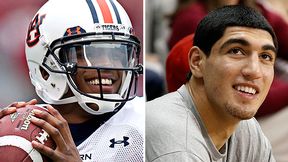 Two days after the NCAA’s controversial Cam Newton ruling, Kentucky asked the NCAA to take a second look at the eligibility of freshman center Enes Kanter.
The school and the NCAA issued a joint statement Friday saying Kentucky has asked for an opportunity to submit additional information about Kanter’s eligibility.
“When a school receives new information that could impact a student-athlete’s eligibility, it is a standard NCAA process to provide the university with an opportunity to resubmit the case for consideration,” the statement said.
Kentucky’s request came two days after the NCAA caused a stir by declaring Newton, the Auburn quarterback, eligible.
Two days after the NCAA’s controversial Cam Newton ruling, Kentucky asked the NCAA to take a second look at the eligibility of freshman center Enes Kanter.
The school and the NCAA issued a joint statement Friday saying Kentucky has asked for an opportunity to submit additional information about Kanter’s eligibility.
“When a school receives new information that could impact a student-athlete’s eligibility, it is a standard NCAA process to provide the university with an opportunity to resubmit the case for consideration,” the statement said.
Kentucky’s request came two days after the NCAA caused a stir by declaring Newton, the Auburn quarterback, eligible.
Mark Emmert, the new NCAA president, acknowledged the Newton case created a loophole in the rules that had to be addressed.
“We recognize that many people are outraged at the notion that a parent or anyone else could ‘shop around’ a student-athlete and there would possibly not be repercussions on the student-athlete’s eligibility,” he said in a statement. “I’m committed to further clarifying and strengthening our recruiting and amateurism rules so they promote appropriate behavior by students, parents, coaches and third parties. We will work aggressively with our members to amend our bylaws so that this type of behavior is not a part of intercollegiate athletics,”





